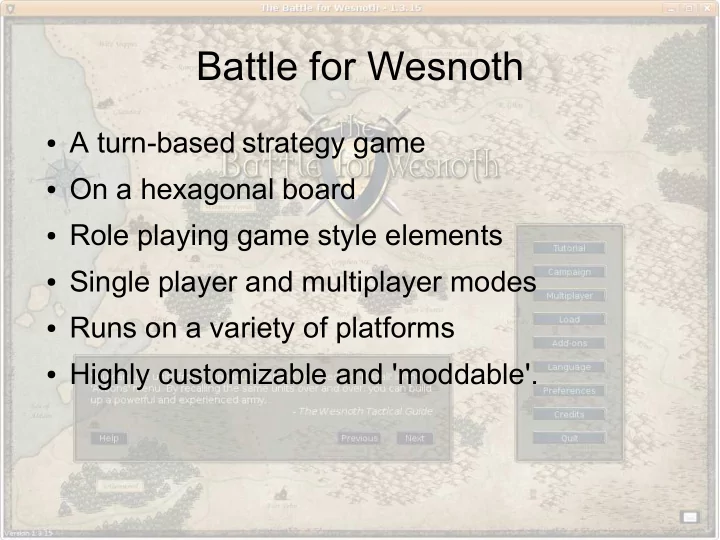

Battle for Wesnoth ● A turn-based strategy game ● On a hexagonal board ● Role playing game style elements ● Single player and multiplayer modes ● Runs on a variety of platforms ● Highly customizable and 'moddable'.
So what's special about it? ● A large developer and player community ● A mature project, but with active development and many improvements ● High quality artwork: both graphics and music ● Very well-balanced by a tireless team of playtesters ● Fun, unique gameplay
Technologies used ● Advanced C++, with some use of Boost ● The Simple Directmedia Layer (SDL) libraries: SDL, SDL_net, SDL_ttf, SDL_image ● gettext for internationalization ● Python to allow scriptable AIs ● Otherwise, most of Wesnoth's technology is “home grown”.
The Wesnoth community ● http://forum.wesnoth.org -- a web forum (phpbb) ● #wesnoth, #wesnoth-dev, #wesnoth-mp and others on irc.freenode.net ● wesnoth-dev@gna.org -- developer mailing list ● http://bugs.wesnoth.org -- bug tracking system
What's hard about making a FLOSS game? ● There is very little 'direction'. There are many ways one can take a game project. ● There is no 'ending'. A game project can be improved indefinitely. ● A game requires mastery of many different disciplines. Technical excellence, artistic excellence, and game design all have to converge.
How it all began ● In June, 2003, I developed a very simple hex war game and released it as “Battle for Wesnoth 0.1”. ● All major gameplay features were already present in this version. ● Francisco Munoz sent me some improved artwork for the game. ● Further releases were made; a forum set up; a community began forming.
The Wesnoth Engine ● ~90k non-blank lines of C++ code. ● Modern style of C++, using the STL, templates, exceptions, and some parts of Boost. RAII is used heavily; very few memory leaks. ● Minimal dependencies; we program many things ourselves ● Includes an AI, WML parser, random map generator, theme/widget engine, and support for all game logic.s
Problems with Wesnoth's Design ● SDL: little new development, slow to do many things. However, OpenGL has been determined not to be a reasonable alternative. ● Other SDL libraries (SDL_ttf, SDL_net) have proved to have various stability and other problems. ● Sometimes slow ● Memory hungry
Networking Wesnoth ● Not originally designed to be networked. ● Originally, saves could only take place at the end of a scenario. ● Later, saves implemented as start-scenario + deltas (“replay”) ● This allowed for replays of a game to be stored ● Also allowed sending deltas over the network to implement network multiplayer
Networking Wesnoth (cont.) ● Very thin/dumb server that forwards data and little more ● Allows a very efficient server that can service many clients. No meta-server needed. ● Clients must have exactly the same version and data. ● Cheating by modifying source code is very easy.
Wesnoth Multiplayer ● A sub-community focused on multiplayer soon formed. ● Multiplayer developers began concentrating on tuning and playtesting the game more finely than before. ● Six different factions, many maps, finely tuned and balanced.
Wesnoth Markup Language (WML) ● An XML-like language which is used throughout Wesnoth. ● Is used to create scenarios, campaigns, define units, define display and theme settings, and as the save game and network protocol format. ● Also supports a pre-processor to make things easier. ● Has evolved greatly over time.
Wesnoth Map Editor ● Much of Wesnoth's code is reused to make a map editor. ● Allows easily and advanced creation of maps. ● Doesn't support any WML. One must add units, events, etc to a map oneself.
Wesnoth's AI ● Wesnoth is a complex problem for an AI to solve: huge state space, incomplete information, non-deterministic outcomes. ● There is a 'default' C++ AI, and support for more AI's to be written in C++ or Python. ● All of the current AI's use simple heuristic based approaches. ● Default AI is configurable.
Wesnoth's Artwork ● Wesnoth began with no artists at all. ● Made adding art as easy as possible to attract artists. ● Maintained a policy of “if someone does the art for this feature, I will do the code” ● Many of Wesnoth's current artists taught themselves art during development. ● Strong artists work with weaker artists. ● Artists misunderstanding or disliking the GPL and FLOSS has been an ongoing problem.
Internationalization ● Originally there were no plans or design to internationalize Wesnoth. ● Later, we added support for gettext. ● WML has internationalization support: any value that is preceded by a “_” will be translatable. ● Now there is a large community of translators. ● There are now translations into over 30 languages, including languages such as Latin and Esperanto.
Other Cool Features ● Wesnoth's community constantly produces cool tools and features. ● Add-on Server ● stats.wesnoth.org (Rusty Russell) ● units.wesnoth.org ● phpbb forum extensions ● WML lint (Eric Raymond)
How to get involved... ● Participate on the Wesnoth forums and IRC channel ● Find an area of interest and submit a patch ● Contributors of 2-3 useful patches are typically granted SVN access ● Contribute to Wesnoth (or another Open Source project) as part of Google's Summer of Code (http://code.google.com/soc).
Recommend
More recommend